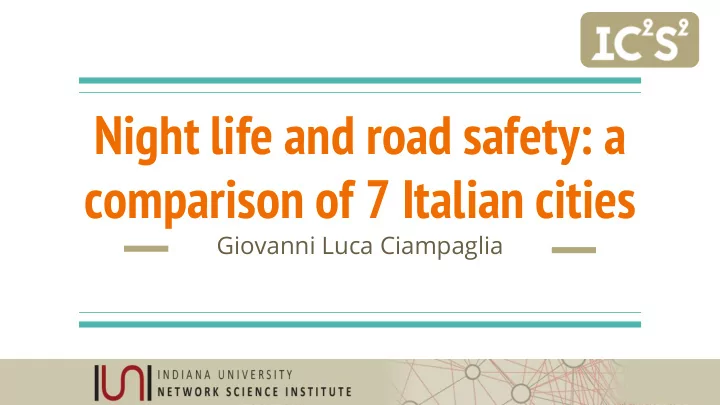

Night life and road safety: a comparison of 7 Italian cities Giovanni Luca Ciampaglia
WARNING: NO networks in this talk!
Genesis
TBDC 15: The data 7 major Italian cities: (Rome, Naples, Milan, Turin, Venice, Bari, Palermo) ❖ North to south ➢ Includes greater metropolitan areas in most cases ➢ Diverse dataset ❖ 2x Mobility ( Infoblu , Viasat) datasets ➢ Calls + SMS + Internet (TIM) ➢ Presence (computed from mobile users data) ➢ Demographics (gender, age-range and living area of callers) ➢ Economics (List of companies, headquarters, branches of firms from Cerved DB) ➢ Social (geolocalized data via API; didn’t get those…) ➢ Car accidents (geolocalized claims from Unipol insurer) ➢ Census data (ISTAT) + various shapefiles ➢
Mobility data Trips Frequency (natural log.) Latitude Units / 10 4 Longitude Units / 10 4
1. Is there a relation between traffic, speed, and accidents? 2. Can we predict what are the Research Questions most risky areas for accidents? 3. Can we glean more if adding social data? a. Text (tweet) while driving b. Guessing DUI driving
Accidents data
Traffic vs accidents
Zero-inflated models
Zero-inflated Fit Results
Traffic vs accidents (cleaned)
Accidents vs speed
Tweets vs speed
Where are we now? Prediction task ❖ Target: accidents in a cell ➢ Predictors: speed, traffic, tweets ➢ Actually adding tweets does NOT improve error ➢ Looking at routes ❖ Where are the trips that results in accidents originate from and are directed to? ➢
Thanks! José Ramasco - IFISC, Spain Bruno Gonçalves - NYU, USA
Recommend
More recommend